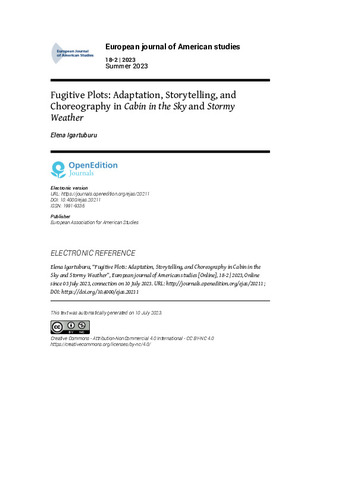Fugitive Plots: Adaptation, Storytelling, and Choreography in Cabin in the Sky and Stormy Weather
Autor(es) y otros:
Palabra(s) clave:
cine
literatura
estudios ingleses
performance
estudios postcoloniales
Fecha de publicación:
Citación:
Resumen:
Cabin in the Sky and Stormy Weather are two 1943 all-Black cast musicals made within the studio system. When compared they exemplify some of the changes taking place in this system regarding the representation of Black people and visualize the work of networks of Black performers and film workers with clear goals grounded on Black solidarity and unity. Using the concept of maroonage and the theories of image circulation proposed by Christina Sharpe (2016) and Sylvia Wynter (2016), I analyze the production history of the films, their origin in multiple adaptations, and their use of music and dance to illuminate the existence of micro agency within the film. I argue that micro agency moves progressive representations of Black people forward. Similarly, micro agency creates a tension between telos and aesthetics in these films that fulfills a fugitive logic that challenges that of capitalism as it is imbued in the studio system and the American imaginary presented on screen.
Cabin in the Sky and Stormy Weather are two 1943 all-Black cast musicals made within the studio system. When compared they exemplify some of the changes taking place in this system regarding the representation of Black people and visualize the work of networks of Black performers and film workers with clear goals grounded on Black solidarity and unity. Using the concept of maroonage and the theories of image circulation proposed by Christina Sharpe (2016) and Sylvia Wynter (2016), I analyze the production history of the films, their origin in multiple adaptations, and their use of music and dance to illuminate the existence of micro agency within the film. I argue that micro agency moves progressive representations of Black people forward. Similarly, micro agency creates a tension between telos and aesthetics in these films that fulfills a fugitive logic that challenges that of capitalism as it is imbued in the studio system and the American imaginary presented on screen.
ISSN:
Patrocinado por:
This publication is a result of MU-21-UP2021-030 75779727 funded by the Spanish Ministry of Universities and by the European Union-NextGenerationEU/PRTR, and of grant PID2021-127052OB-I00 funded by MCIN/AEI/ 10.13039/501100011033 and ERDF A way of making Europe. The author also wishes to acknowledge the financial support provided by the Government of Asturias, FICYT and ERDF A way of making Europe, through grant AYUD/ 2021/51893.
Colecciones
- Artículos [37548]
- Filología Inglesa, Francesa y Alemana [591]
- Investigaciones y Documentos OpenAIRE [8420]
Ficheros en el ítem





